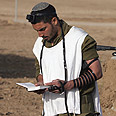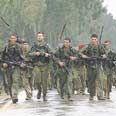
Religious soldier
Photo: Tsafrir Abayov

Boot camp
Photo: IDF's Spokesperson Unit
The dispute over the hesder yeshiva program, in which religious soldiers spend part of their military in the army but the majority of their time studying in yeshiva, refuses to die. Major-General Elazar Stern won’t let it drop, and not all religious Israelis entirely agree with it, but many people, even outsiders, praise it. And what does the Israeli public think? It too is divided.
Forty-seven percent believe that the hesder program is a successful combination that produces the best fighters, and 40 percent call for equal army service for the entire population. The weekly survey by Ynet and the Gesher organization shows that 89 percent of respondents would not oppose serving with people whose religious outlook differs from their own.
Haredi Nahal
Hanan Greenberg
Recruit number 2,000 to haredi regiment says that while best way to defend Israel is by studying Torah, those who are unable to do so must join the IDF
The survey, conducted by the Mutagim Institute, included 500 respondents who were a representative sampling of the Hebrew-speaking adult Jewish population.
A surprising finding
In answer to the question, “How do you see soldiers from hesder yeshivot?” 47 percent of those surveyed responded that they were the best fighters, successfully combining Torah study with army service. Nevertheless, 40 percent said that they would prefer to see hesder students doing a full, three-year army service like other citizens, and 13 percent believed that Torah study required uninterrupted yeshiva study without army service.Fifty-one percent of secular Israeli respondents support full army service for yeshiva students, while 41 percent believe that the hesder track is a successful program. Traditional Israelis were divided, with 45 percent supporting full service and 45 percent supporting the hesder program. Seventy-six percent of religious Israelis support the hesder program and only nine percent prefer full service. Of haredi Jews surveyed, 56 percent claim that Torah study must be uninterrupted. A surprising finding is that 13 percent of the haredim support full and equal army service for hesder yeshiva students.
An age-based analysis of those surveyed indicates that the youngest (aged 18-24), like their parents (aged 45-54) are not enthusiastic about the combination of Torah and army service. These are the only two age cohorts in which more people demanded full-length service for hesder students than said they thought that hesder was a successful combination. In addition, 23 percent-25 percent of them responded that a Torah education requires ongoing study in a yeshiva, almost twice the average of 13 percent. Those 65 and over are also less than enthusiastic about the hesder program. Sixty percent of them would prefer full and equal service, and only 36 percent believe that hesder is a successful combination whose soldiers are among the best fighters.
Still a melting pot
And who would you prefer to spend your army service with? Sixty-four percent of those surveyed declared that it doesn’t matter to them who their comrades-in-arms are, even if they have different world-views, and 25 percent even stated that they would prefer someone different because this is a good opportunity to be “one people with one army.” On the other hand, eight percent admitted that they fear that soldiers with a religious world-view different from their own would interfere with their normal way of life, and three percent said that they are not comfortable in the presence of the other.Religious people seek the melting pot more than others, with 40 percent believing that this is an opportunity to get to know the other and to demonstrate solidarity. Nevertheless, the fear of changing their way of life as a result of the encounter with those different from them is more common among the religious, 13 percent of whom feel this way, as against 8% of the respondents overall.
Gesher director Shoshi Becker believes that the public appreciates hesder yeshiva students because of the unique nature of the Jewish democratic state, which sees a value in combining Torah studies with army service. Nevertheless, Becker calls for the national-religious public to be aware of the other side: 40 percent of the secular and traditional public prefer full, equal service, and reveal less tolerance toward hesder yeshiva students.















